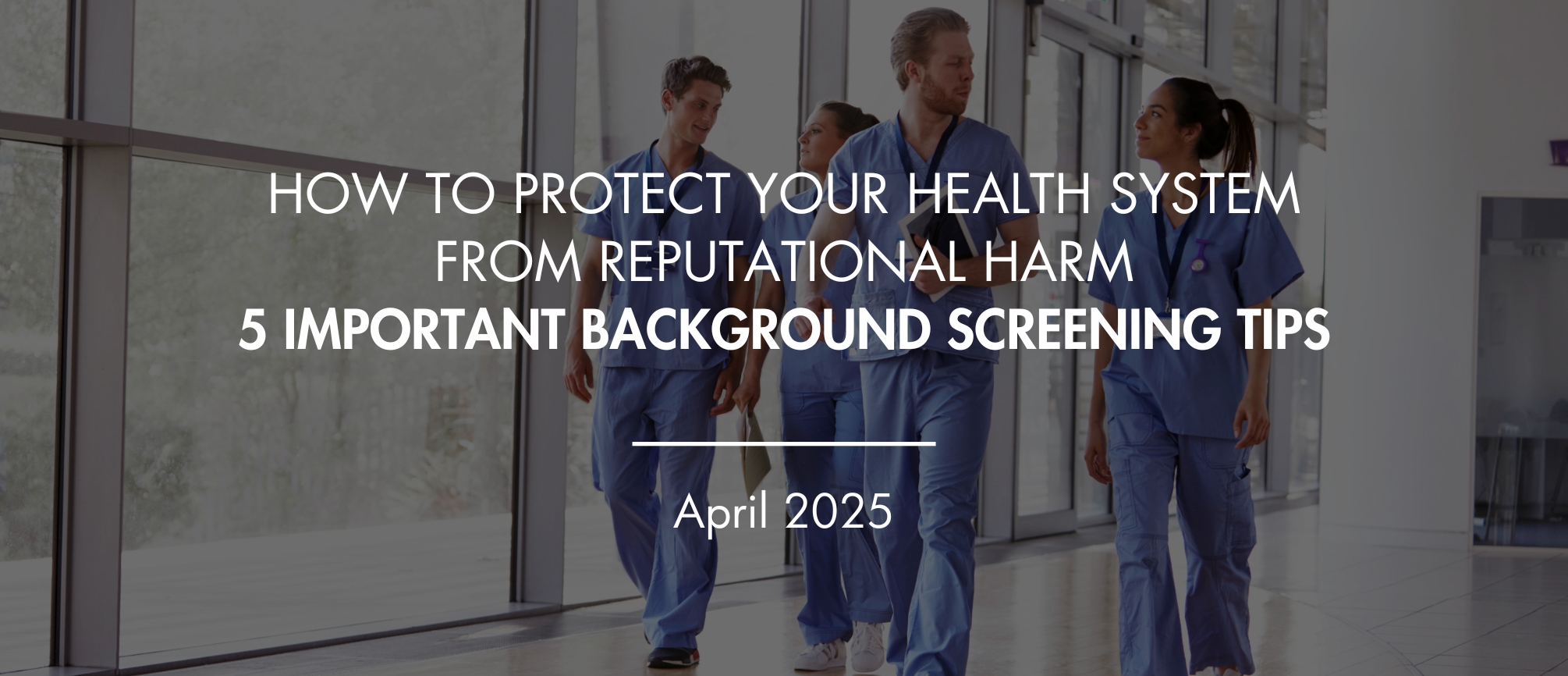With hospital budgets extremely tight, regulatory audits intense, cyber-security attacks increasing and the competition for the labor market moving to an all-time high, it is important that health systems are implementing well thought out strategies in protecting their organization. When speaking specifically about the background screening process of incoming candidates or rescreening employees, it is crucial to make sure the organization is using the right screening partner to support and understand regulatory requirements, protect data, provide best-in-class services and implement quick turnaround times, so new candidates can meet their orientation dates.
Below are five important tips in reducing reputational harm while being sensitive to reduced budgets.
1.Cyber Security – As of December 20, 2024, the U.S. Department of Health and Human Services’ Office for Civil Rights reported 677 major health data breaches, affecting over 182.4 million individuals (bankinfosecurity.com). These statistics underscore the persistent and evolving cybersecurity challenges faced by healthcare organizations which should also be of focus with your background screening provider and any other contractors/vendors you utilize who may need sensitive data. Make sure to review their security protocol, data breach mitigation policies and how they protect your candidate data, also seeing if they have been breached in the past and what their security process includes.
2. Comprehensive Search Versus Budget – Balancing comprehensive background screening searches with budget considerations is critical to ensuring patient safety, regulatory compliance, and organizational integrity. A budget-friendly approach that sacrifices depth can lead to missed red flags, such as undisclosed criminal records, sanctions, or licensing issues, placing patients/employees and reputations at risk. Investing in thorough screening upfront can help prevent costly legal, financial, and reputational consequences down the line, making it a vital component of a responsible hiring process. Work with your background screening provider in understanding what you are including in your scope of work and background screening package, making sure your well thought out process and procedures are providing a peace of mind in protecting your health organization.
3. Meeting Orientation Dates with Quality Searches: Speed Versus Accuracy – Everyone knows that certain US counties and Primary Source verifications may take longer time periods for turnaround. Hospitals must balance the urgency of meeting orientation dates with the necessity of conducting thorough, high-quality background searches to ensure patient safety and compliance. While speed is essential to onboarding new hires, cutting corners in the background screening process can lead to missed criminal records, sanctions, and/or credential discrepancies. A well-structured screening approach prioritizes both speed and accuracy, leveraging advanced technology and best practices to deliver fast, reliable results without compromising quality. By finding this balance, hospitals can meet staffing needs while minimizing risk and maintaining the highest standards of care. Your background screening provider should be proactively providing updates and doing everything possible to return records or it is time to look for a new vendor.
4. Regulatory Sanction Screening Importance– Healthcare sanction screening, including checks against the Office of Inspector General (OIG) List of Excluded Individuals and Entities (LEIE)/ System for Award Management (SAM), is essential for maintaining compliance and protecting patients. Employing individuals or entities excluded from federal healthcare programs can result in hefty fines, legal consequences, the loss of federal funding and reputational damage. In 2024, the OIG site reported at least 30 violations pertaining to excluded/unlicensed individuals which resulted in over $3.3M in penalties and healthcare organizations being named on the site – potentially hurting the health brand/reputation! Routinely screening against these lists (whether monthly or monitoring) ensures that healthcare organizations avoid hiring or continuing to employ sanctioned providers who may pose risks due to fraud, patient harm, or other violations.
5. Primary Source Verifications – Primary Source Verification (PSV) is a critical component of healthcare screening, ensuring that a candidate’s credentials, licenses, and certifications are legitimate and current. Verifying information directly from the issuing source helps prevent fraud, misrepresentation, and unqualified individuals from entering patient care roles. Regulatory bodies like The Joint Commission (TJC) and National Committee for Quality Assurance (NCQA) require PSV to maintain compliance and uphold patient safety standards. Make sure that your background screening firm is following important guidelines and details in protecting your healthcare firm, while also demonstrating urgency in getting each verification completed so your candidates can make their orientation dates!
By making sure you have the right, trusted reliable background screening partner for healthcare screening, you will protect patients, staff, and organizations from unnecessary risks. Through prioritizing comprehensive and accurate screenings, healthcare organizations can build a trusted workforce, enhance patient safety, and maintain regulatory compliance. In your industry where lives are at stake, a strong commitment to due diligence is not just important— it is 100% essential!
Posted by: Rudy Troisi, L.P.I., Founder, CEO, Reliable Background Screening and Dr. Alan Lasky, SVP Client Success & Partnerships.
This content is for informational purposes only and not legal advice or binding case law. Consult qualified legal counsel for assistance.
Copyright © 2025, Reliable Background Screening, a Division of Marcett, Inc. All rights reserved.


